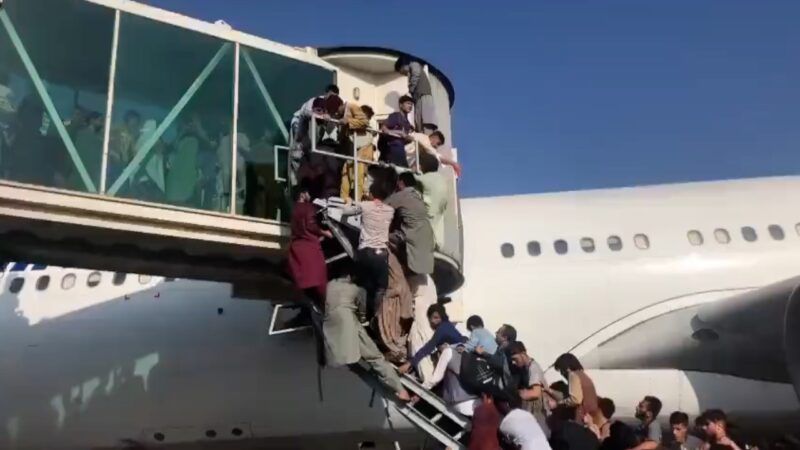We Need To Get Afghans Out of Afghanistan Too
What Afghan civilians need now is resettlement, not remilitarization.

After 20 years of U.S. military intervention, trillions of dollars lost, and thousands of soldiers and civilians killed in Afghanistan, that conflict's conclusion is now written. Afghanistan has fallen to the Taliban. President Ashraf Ghani has fled the country.
The Taliban's quick takeover defied even the most pessimistic projections from America's foreign policy elites. Critics spent the weekend decrying the withdrawal as premature. But those years, dollars, and lives invested in training Afghan forces produced a guard that wouldn't—or couldn't—defend its own country. It's highly unlikely that the U.S. could change that reality if only American troops had stayed a bit longer.
Afghans can no longer find hope within their country's borders, and the U.S. shouldn't attempt to install that hope there. But America can still give many Afghans what they need the most: an escape route.
Other countries have already stepped up to the challenge. Canada promised to admit more than 20,000 vulnerable Afghan citizens. The U.S. has taken a far less concrete approach. Reuters reported last week that officials were "scour[ing] for countries willing to house Afghan refugees" while their U.S. visa applications are processed. They've pestered Kazakhstan, Tajikistan, and Uzbekistan to take in at-risk Afghans who worked for the U.S. government, but they have not reached an agreement with any of those countries. Albania, Kosovo, and North Macedonia have graciously offered to house some political refugees, but only "temporarily."
American options exist. Guam, painted by advocates as a viable visa processing point since early in President Joe Biden's withdrawal, offered its territory as a landing pad back in June. "Guam has stood ready to serve as a safe and secure route for this type of humanitarian effort throughout our history," wrote Gov. Lou Leon Guerrero to Biden. "I assure you that my administration is prepared to assist in executing your plans on this matter should Guam be chosen."
There are now reports that the Department of Defense is preparing to bring thousands of Afghan refugees to American military bases, including Wisconsin's Fort McCoy and Texas' Fort Bliss. So far, around 2,000 Afghans who assisted the U.S. military and applied for special immigrant visas (SIVs) have been airlifted to the U.S. with their families. But it's a drop in the bucket, since up to 50,000 SIV applicants and their family members are estimated to be waiting on answers and evacuation flights. When factoring in civilians in other vulnerable groups, there's no telling how many Afghans would migrate if given the chance.
Since the beginning of the year, the United Nations High Commissioner for Refugees reports that about 400,000 Afghans have been internally displaced. Nearly 120,000 of them fled from rural areas and smaller cities to Kabul Province—though that government stronghold has now also fallen to the Taliban. Of those who have fled within Afghanistan's borders since the end of May, 80 percent are women and children.
Nobody is safe from the Taliban's terror. Women are being forced to leave their jobs. Afghan interpreters who assisted Western militaries are in hiding or on the run, fearing they will be murdered. Thousands of people, desperate for any way out of the country, have flocked to Hamid Karzai International Airport. Videos from today appeared to show people clinging to a military plane while it left Kabul, falling to the ground as the aircraft climbed.
"This is not the moment for bureaucracy," says Adam Weinstein, a Quincy Institute research fellow and an Afghanistan veteran. "Washington needs to evacuate as many special immigrant visa applicants and human rights defenders as possible and sort out the details later."
To Weinstein, "the U.S.-led war in Afghanistan was never really about Afghans." It was "driven by terrorism," even if human rights gains sometimes served as a public justification. "President Biden had the fortitude to end the charade."
More than just ending the charade, Biden has the opportunity to allow Afghans into the U.S. for what past presidents claimed they would be getting in their own country: liberty, opportunity, legal equality, and safe living. Even if the war in Afghanistan wasn't about the Afghans, the withdrawal can be.
"A more sustainable foreign policy would be informed by the expertise of local voices while acknowledging the limits of American influence," says Weinstein. American military influence couldn't keep Afghanistan from falling to the Taliban. But the power of refuge could still save thousands.


Show Comments (248)